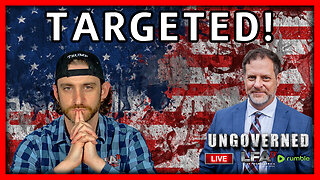Premium Only Content

55 - Assets or Liabilities - The Impact on Relationships & Fostering Healthier Connections
Is it time to reassess how we view those in our lives as mere commodities? Join us on a thought-provoking journey as we explore the psychological underpinnings of seeing people as assets or liabilities and the undeniable impact this has on our relationships. With insights drawn from evolutionary psychology and economic theory, we unravel why such a mindset persists from our ancestors' survival strategies to modern-day relationship dynamics. Our conversation cuts deep into the dehumanizing effects this view can have and how it can skew the balance of our connections, potentially harming our self-worth and decision-making processes.
As we navigate the terrain of human valuation, we pivot towards enlightenment and self-improvement. We'll share strategies to foster empathy, compassion, and a recognition of the intricate nature of individuals beyond superficial assessments. You'll hear from experts on how to cultivate self-awareness, self-compassion, and mutual growth within your relationships. This episode is not just about the what and why—it's about the how. How can we build connections rooted in mutual respect and shared development? How can we embrace a growth mindset together? Tune in for an episode that promises to challenge your perspectives and inspire a transformation towards more authentic, meaningful relationships.
#I4L #informationforlife #relationships #assetsliabilities #evolutionarypsychology #economics #dehumanization #selfworth #empathy #compassion #selfawareness #selfcompassion #reciprocity #growthmindset #personaldevelopment #communication #authenticconnections #relationshipadvice #healthyrelationships #understandingpeople
Baumeister, R. F., & Leary, M. R. (1995). The need to belong: Desire for interpersonal attachments as a fundamental human motivation. Psychological Bulletin, 117(3), 497–529.
Brown, B. (2022). The Gifts of Imperfection: 10th Anniversary Edition: Features a new foreword and brand-new tools (Anniversary edition). Hazelden Publishing.
Buss, D. (2019). Evolutionary Psychology: The New Science of the Mind (6th edition). Routledge.
Buss, D. M., & Schmitt, D. P. (2011). Evolutionary Psychology and Feminism. Sex Roles, 64(9–10), 768–787. https://doi.org/10.1007/s11199-011-9987-3
Covey, S. R., Collins, J., & Covey, S. (2020). The 7 Habits of Highly Effective People: 30th Anniversary Edition (Anniversary edition). Simon & Schuster.
Dweck, C. S. (2008). Mindset: The new psychology of success (Ballantine Books trade pbk. ed). Ballantine Books.
Finkel, E. J., Hui, C. M., Carswell, K. L., & Larson, G. M. (2014). The Suffocation of Marriage: Climbing Mount Maslow Without Enough Oxygen. Psychological Inquiry, 25(1), 1–41. https://doi.org/10.1080/1047840X.2014.863723
Gottman, J., & Silver, N. (2015). The Seven Principles for Making Marriage Work: A Practical Guide from the Country’s Foremost Relationship Expert (Revised ed. edition). Harmony.
Gruenfeld, D. H., Inesi, M. E., Magee, J. C., & Galinsky, A. D. (2008). Power and the objectification of social targets. Journal of Personality and Social Psychology, 95(1), 111–127. https://doi.org/10.1037/0022-3514.95.1.111
Haslam, N. (2006). Dehumanization: An Integrative Review. Personality and Social Psychology Review, 10(3), 252–264. https://doi.org/10.1207/s15327957pspr1003_4
Illouz, E. (2013). Why Love Hurts: A Sociological Explanation (1st edition). Polity.
Loewenstein, G. F., Weber, E. U., Hsee, C. K., & Welch, N. (2001). Risk as feelings. Psychological Bulletin, 127(2), 267–286. https://doi.org/10.1037/0033-2909.127.2.267
Neff, K. (2015). Self-Compassion: The Proven Power of Being Kind to Yourself (Reprint edition). William Morrow Paperbacks.
Neff, K., & Germer, C. (2018). The Mindful Self-Compassion Workbook: A Proven Way to Accept Yourself, Build Inner Strength, and Thrive (Workbook edition). The Guilford Press.
Orth, U., Robins, R. W., & Widaman, K. F. (2012). Life-span development of self-esteem and its effects on important life outcomes. Journal of Personality and Social Psychology, 102(6), 1271–1288. https://doi.org/10.1037/a0025558
Pfeffer, J. (2010). Building Sustainable Organizations: The Human Factor. Academy of Management Perspectives, 24(1), 34–45. JSTOR.
Reis, H. T., Clark, M. S., & Holmes, J. G. (2004). Perceived Partner Responsiveness as an Organizing Construct in the Study of Intimacy and Closeness. In Handbook of closeness and intimacy. (pp. 201–225). Lawrence Erlbaum Associates Publishers.
Rogers, C. (1995). A Way Of Being (1st edition). HarperOne.
TEDx Talks (Director). (2013, December 12). The power of empathy: Helen Riess at TEDxMiddlebury. https://www.youtube.com/watch?v=baHrcC8B4WM
-
 LIVE
LIVE
Steven Crowder
1 hour ago🔴 10th Annual Halloween Spooktacular: Reacting to the 69 Gayest Horror Movies of All Time
10,039 watching -
 LIVE
LIVE
The Rubin Report
17 minutes agoKamala Gets Visibly Angry as Her Disaster Interview Ends Her 2028 Election Chances
226 watching -
 LIVE
LIVE
VINCE
2 hours agoA Very Trump Halloween | Episode 159 - 10/31/25
29,327 watching -
 LIVE
LIVE
LFA TV
14 hours agoLIVE & BREAKING NEWS! | FRIDAY 10/31/25
2,642 watching -
 LIVE
LIVE
Badlands Media
9 hours agoBadlands Daily: October 31, 2025
4,209 watching -
 1:34:28
1:34:28
Graham Allen
2 hours agoSCARY: Kamala Had MELT DOWN Over Trump!! Does LSU Hate Charlie Kirk?! + Top Halloween Movies Of ALL TIME!!
62.1K33 -
 LIVE
LIVE
Caleb Hammer
42 minutes agoShe Blames MAGA For Her Debt | Financial Audit
105 watching -
 LIVE
LIVE
The Big Mig™
2 hours agoWhat To Give The Man Who Has EVERYTHING!
124 watching -
 LIVE
LIVE
Benny Johnson
1 hour agoSHOCK: Massive Food Stamp FRAUD Exposed: 59% of Welfare are Obese Illegal Aliens!? Americans RAGE…
4,836 watching -
 LIVE
LIVE
Wendy Bell Radio
6 hours agoAmerica Deserves Better
7,131 watching